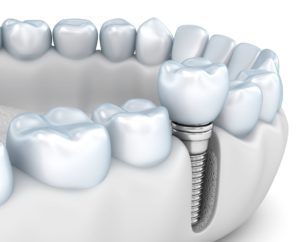Missing teeth will leave gaps that disrupt the look of your smile and make oral functions more difficult for you. But tooth loss can also lead to further oral health complications without tooth replacement from your dentist.
For a restorative solution that will most effectively replace your missing teeth, ask your dentist about dental implants. Only this treatment option will preserve your jawbone in the aftermath of tooth loss. Read on to discover how implant dentistry can help your jawbone health.

What Happens to the Jawbone When You Lose a Tooth?
In healthy dental patients, each tooth extends into a root that reaches below the gumline to the jaw. This root stimulates the bone in the jaw, keeping it strong and stable.
If a patient loses a tooth, the jawbone no longer receives stimulation from a tooth root. In its absence, the bone can begin to deteriorate.
This can lead to many structural dental concerns. The face may appear to sag, the remaining teeth may shift out of place, and the jaw function will weaken. This effect will continue without intervention from a dentist.
How Do Dental Implants Affect the Jaw?
Dentists can replace one, several, or an entire arch of missing teeth using dental implants. These devices feature a titanium post anchor that a dentist must surgically insert into the jaw. There, the anchor fuses with the jaw to provide optimal support that will sustain the prosthetic teeth that will attach to these anchors via an abutment at the gumline.
Many tooth replacements, like removable dentures, replace teeth at the gumline. The anchor of a dental implant, however, serves as a substitute for the missing tooth root. It provides stimulation for the jaw once more, stopping bone from degenerating.
Its presence can also encourage bone that was already lost to regrow. Therefore, a patient can experience maximum oral health preservation and enhancement through implant dentistry.
Can My Jaw Support a Dental Implant?
Though its advantages are clear, not every patient will qualify for tooth replacement with dental implants. Because the devices rely on anchors that fuse with the jawbone, the candidate must possess enough healthy jawbone to support this process.
If too much bone has deteriorated after tooth loss, the jaw cannot successfully receive the anchor to support an implant. Before pursuing this treatment, the dentist uses x-ray imaging to evaluate the health of the jawbone.
The dentist may recommend a bone graft to add more structure to the jaw for some patients. In this oral surgery, a dentist takes bone material and attaches it to the existing bone to create a more solid foundation in the jaw.
After this heals, it may then be strong enough to sustain a dental implant. If this treatment is not feasible, your dentist may recommend alternative tooth replacement solutions. In any case, do not ignore your missing teeth and talk to your dentist about the best way to restore your smile.
